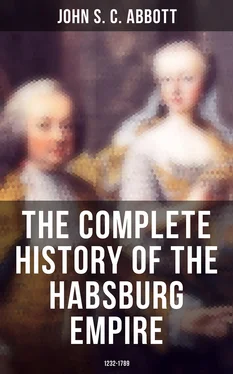1 ...8 9 10 12 13 14 ...25 In the meantime, Albert, at Vienna, apparently happy in being relieved of all care of the Swiss provinces, was devoting himself to the arts of peace. He reared new buildings, encouraged learning, repressed all disorders, and cultivated friendly relations with the neighboring powers. His life was as a summer's day—serene and bright. He and his family were happy, and his realms in prosperity. He died at his rural residence at Laxendorf, two miles out from Vienna, on the 29th of August, 1395. All Austria mourned his death. Thousands gathered at his burial, exclaiming, "We have lost our friend, our father!" He was a studious, peace-loving, warm-hearted man, devoted to his family and his friends, fond of books and the society of the learned, and enjoying the cultivation of his garden with his own hands. He left, at his death, an only son, Albert, sixteen years of age.
William, the eldest son of Leopold, had been brought up in the court of Vienna. He was a young man of fascinating character and easily won all hearts. After his bitter disappointment in Poland he returned to Vienna, and now, upon the death of his uncle Albert, he claimed the reins of government as the oldest member of the family. His cousin Albert, of course, resisted this claim, demanding that he himself should enter upon the post which his father had occupied. A violent dissension ensued which resulted in an agreement that they should administer the government of the Austrian States, jointly, during their lives, and that then the government should be vested in the eldest surviving member of the family.
Having effected this arrangement, quite to the satisfaction of both parties, Albert, who inherited much of the studious thoughtful turn of mind of his father, set out on a pilgrimage to the holy land, leaving the government during his absence in the hands of William. After wanderings and adventures so full of romance as to entitle him to the appellation of the "Wonder of the World," he returned to Vienna. He married a daughter of the Duke of Holland, and settled down to a monkish life. He entered a monastery of Carthusian monks, and took an active part in all their discipline and devotions. No one was more punctual than he at matins and vespers, or more devout in confessions, prayers, genuflexions and the divine service in the choir. Regarding himself as one of the fraternity, he called himself brother Albert, and left William untrammeled in the cares of state. His life was short, for he died the 14th of September, 1404, in the twenty-seventh year of his age, leaving a son Albert, seven years old. William, who married a daughter of the King of Naples, survived him but two years, when he died childless.
A boy nine years old now claimed the inheritance of the Austrian estates; but the haughty dukes of the Swiss branch of the house were not disposed to yield to his claims. Leopold II., who after the battle of Sempach succeeded his father in the Swiss estates, assumed the guardianship of Albert, and the administration of Austria, till the young duke should be of age. But Leopold had two brothers who also inherited their father's energy and ambition. Ernest ruled over Styria, Carinthia and Carniola. Frederic governed the Tyrol.
Leopold II. repaired to Vienna to assume the administration; his two brothers claimed the right of sharing it with him. Confusion, strife and anarchy ensued. Ernest, a very determined and violent man, succeeded in compelling his brother to give him a share of the government, and in the midst of incessant quarrels, which often led to bloody conflicts, each of the two brothers strove to wrest as much as possible from Austria before young Albert should be of age. The nobles availed themselves of this anarchy to renew their expeditions of plunder. Unhappy Austria for several years was a scene of devastation and misery. In the year 1411, Leopold II. died without issue. The young Albert had now attained is fifteenth year.
The emperor declared Albert of age, and he assumed the government as Albert V. His subjects, weary of disorder and of the strife of the nobles, welcomed him with enthusiasm. With sagacity and self-denial above his years, the young prince devoted himself to business, relinquishing all pursuits of pleasure. Fortunately, during his minority he had honorable and able teachers who stored his mind with useful knowledge, and fortified him with principles of integrity. The change from the most desolating anarchy to prosperity and peace was almost instantaneous. Albert had the judgment to surround himself with able advisers. Salutary laws were enacted; justice impartially administered; the country was swept of the banditti which infested it, and while all the States around were involved in the miseries of war, the song of the contented husbandman, and the music of the artisan's tools were heard through the fields and in the towns of happy Austria.
Sigismond, second son of the Emperor Charles IV., King of Bohemia, was now emperor. It will be remembered that by marrying Mary, the eldest daughter of Louis, King of Hungary and Poland, he received Hungary as the dower of his bride. By intrigue he also succeeded in deposing his effeminate and dissolute brother, Wenceslaus, from the throne of Bohemia, and succeeded, by a new election, in placing the crown upon his own brow. Thus Sigismond wielded a three-fold scepter. He was Emperor of Germany, and King of Hungary and of Bohemia.
Albert married the only daughter of Sigismond, and a very strong affection sprung up between the imperial father and his son-in-law. They often visited each other, and cooperated very cordially in measures of state. The wife of Sigismond was a worthless woman, described by an Austrian historian as "one who believed in neither God, angel nor devil; neither in heaven nor hell." Sigismond had set his heart upon bequeathing to Albert the crowns of both Hungary and Bohemia, which magnificent accessions to the Austrian domains would elevate that power to be one of the first in Europe. But Barbara, his queen, wished to convey these crowns to the son of the pagan Jaghellon, who had received the crown of Poland as the dowry of his reluctant bride, Hedwige. Sigismond, provoked by her intrigues for the accomplishment of this object, and detesting her for her licentiousness, put her under arrest. Sigismond was sixty-three years of age, in very feeble health, and daily expecting to die.
He summoned a general convention of the nobles of Hungary and Bohemia to meet him at Znaim in Moravia, near the frontiers of Austria, and sent for Albert and his daughter to hasten to that place. The infirm emperor, traveling by slow stages, succeeded in reaching Znaim. He immediately summoned the nobles to his presence, and introducing to them Albert and Elizabeth, thus affectingly addressed them:
"Loving friends, you know that since the commencement of my reign I have employed my utmost exertions to maintain public tranquillity. Now, as I am about to die, my last act must be consistent with my former actions. At this moment my only anxiety arises from a desire to prevent dissension and bloodshed after my decease. It is praiseworthy in a prince to govern well; but it is not less praiseworthy to provide a successor who shall govern better than himself. This fame I now seek, not from ambition, but from love to my subjects. You all know Albert, Duke of Austria, to whom in preference to all other princes I gave my daughter in marriage, and whom I adopted as my son. You know that he possesses experience and every virtue becoming a prince. He found Austria in a state of disorder, and he has restored it to tranquillity. He is now of an age in which judgment and experience attain their perfection, and he is sovereign of Austria, which, lying between Hungary and Bohemia, forms a connecting link between the two kingdoms.
"I recommend him to you as my successor. I leave you a king, pious, honorable, wise and brave. I give him my kingdom, or rather I give him to my kingdoms, to whom I can give or wish nothing better. Truly you belong to him in consideration of his wife, the hereditary princess of Hungary and Bohemia. Again I repeat that I do not act thus solely from love to Albert and my daughter, but from a desire in my last moments to promote the true welfare of my people. Happy are those who are subject to Albert. I am confident he is no less beloved by you than by me, and that even without my exhortations you would unanimously give him your votes. But I beseech you by these tears, comfort my soul, which is departing to God, by confirming my choice and fulfilling my will."
Читать дальше












